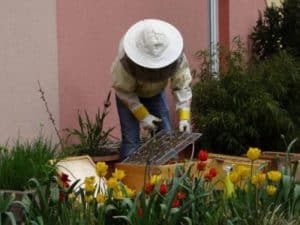Beekeeping may be a hobby to some people, and they would like to experience it first hand in their home. The legalities of keeping bees in a residential area would depend on where you live. It can be allowed in one city, but when you reach the next town, it can be entirely illegal.
Is It Legal to Keep Bees in a Residential Area? Yes, it is legal to keep bees in certain parts of a residential area. However, there are some cities that do not allow beekeeping in a certain area. There are also other locations were you just need to obtain a permit or license to practice beekeeping at your home.
Bees are essential to the environment due to their pollination. This is one great reason why some people would like to keep bees at their home. There is a lot to consider when it comes to beekeeping at your home. In this article, you will know the different rules and regulations in your area about beekeeping.
If you are interested in learning more about how to cultivate your garden to be friendly to bees and other insects or the basics of becoming a beekeeper, checkout our online course recommendations here.
Table of Contents
Is it Safe to Have a Beehive in Your Backyard?

It is safe to have a beehive in your backyard. Many beekeepers have beehives in their backyards, and for those who live in the city, they usually keep it on their roof-tops.
You would need to consider a lot of preparation so that the bees do not bother the people that’s around you. It is recommended that residential beekeepers should start with just two or three hives.
Water Sources in a Residential Area
When it comes to honey bees, they need to collect water, especially during spring and summer. Bees love to collect water in ponds and creeks, which you cannot find in a residential area. To prevent bees from looking for water at your neighbor’s yard, you should start a small water garden with floating plants.
One thing that you would need to remember when creating a bee station is bees would need something that they can land on in order for them to not drown. You can also use dripping faucet which drips to a wooden board. This may be harder to manage than the water garden because it should be available at all times.
Another option is to have a bird bath with small rocks in them so that the bees won’t drown. It is also great to put a plant or two in your bird bath in order to attract them. The more rocks and water that you put in the better it will be.
Bees prefer not to have their water too close to their hive. Make sure that the water should be at least 20 feet away from the bee’s hive.
Fence
This is probably the most crucial factor that you would need to consider when keeping bees in your home. Bees usually travel in a straight path when going to their hive. Your fence should be at least six feet high. This reduces the chance of a bee colliding with the people that are passing by your home.
There are a lot of people who are concerned when one of their neighbors is taking care of bees. Having a high fence hides the fact that you are taking care of bees in your backyard. It also provides wind protection to the bee’s hives.
Swarm Control
Now, you cannot prevent swarming when it comes to taking care of bees. Swarms are usually gentle since bees eat a lot of honey before they swarm. When bees swarm, they form a cluster within 100 feet away from their old hive.
Creating a “bait hive” is an excellent way to prevent swarms from going into your neighbor’s home. This can be made by an old hive body that is at least one cubic foot in volume and has an opening of about one or two square inches.
The best place to put you bait hive is in a shady spot where bees have lived before. It should also be in an area that is wind protected and about ten feet off the ground. It is excellent to have at least an old frame of honeycomb in it to attract the bees.
Bee hotels are one good example to make for your “bait hive”. It is easy to make and you can even get creative when making these. It takes a lot of effort in keeping your bees in check. This is for the safety of the people around you and the bees themselves.
Do I need a permit to keep bees?
The permit would depend on the local area where you live. There are few communities that outlaw’s beekeeping. There are some areas where there is a limit on the number of hives that people should keep.
Every city has their own rule when it comes to beekeeping in your residential area. In some places, you can keep bees with small restrictions while in others, you cannot keep them at all. There are a lot of different factors to consider when you are planning to keep bees.
The laws regarding beekeeping are pervasive. It is always advisable to check with your local laws to make sure if they are allowed or not. Now, if the rules on beekeeping are not clear, you can always contact your local zoning enforcement officer.
How Close to a House Can Your Keep Bees?

Beekeeping may be a hobby to some people, but there is a lot to learn along the way. If you are new to beekeeping, it will be your choice where you would place your bees. The number one thing that you would need to understand is a bee’s flight.
Bees can fly miles and miles away from their hives. However, if you live in a local area where nectar is in short supply, bees tend to have a routine. Bees are just like any animal; they have their daily routine and a path that they follow.
If the hives are close to your home, bees may have a hard time to gain altitude. This would result in the bees flying in different directions. You should always have a good enough space between your home and the hives to allow bees to operate in any direction without issue.
Honeybees tend to be lazy. Since this is the case, they can get food within ten feet of their hive rather than flying miles away. Having said this, placing bees near your home may result in them trying to get the food in your home.
Another thing that you should keep in mind is your neighbors. They may not like bees flying into their property, so you should place the bees far from your neighbor’s home. There’s no specific number of feet that you should take note of when placing your beehive in your home.
It all boils down to considering all the variables that are said above. The main goal of keeping bees is to manage hives that grows year to year. Placing your hives in the right place plays a significant role when it comes to successful beekeeping.
Countries Where Beekeeping is Legal
United States

There are different rules when it comes to beekeeping in the United States. It does not only vary from state to state but also city to city. There are many to mention, but here are a few examples of the rules in each state.
In Florida, you can only keep bees in a non-agricultural private land only with written permission. While in Cleveland, Ohio, beekeepers need a two-year license which costs $50.
In Tucson and Arizona, you are only allowed one hive per 2,500 square feet of property. There’s not much restriction, as long as your bees do not bother other people — just some basic rules such as five feet from the property line.
Canada

In Canada, beekeepers should have their hives register with the province where they were kept. These are usually the Ministry of Agriculture part of your country. This is the only requirement that you need to keep bees in your area.
The honey bee hives are the only ones that need to be registered. The mason bees, on the other hand, does not need to be registered. Some cities don’t allow beekeeping at all. Others turn a blind eye as long as they do not bother anyone.
It is also a requirement to get a permit if you are transporting bees from one place to another. There are also a few provinces that need a license to sell hives for beekeeping. Beehives are also inspected by Canada’s Bee Act to make sure that they are free of diseases.
One regulation is to keep the beehives at least 30 meters from all property lines, and it can’t be placed within ten meters along the highway.
Australia

Just like the other countries, some places in Australia require a permit when it comes to beekeeping. These are usually assessed from case to case basis. The circumstances that you would not need a permit if your beehives are kept a certain distance from adjacent properties.
In New South Wales, you will need to register your beehive with the Department of Primary Industries. If you are keeping bees for business, the permit costs $100, and you are keeping bees for recreational purposes it costs $60.
Once you are registered, you will receive registration numbers for each hive that you have. The regulations in Australia are similar to Canada. Australians are responsible for reporting any signs of disease to the authorities so that they can inspect it.
Conclusion
To summarize everything, keeping bees is legal depending on your location. There are some states or cities that do not allow beekeeping in residential areas. It is essential to check your local laws to make sure if beekeeping is allowed in your location or not. Consider every factor that you would need to keep bees in your home. One of the most important factors when keeping bees in a residential area is you have to ensure that it does not bother the people around you.
If you are interested in learning more about how to cultivate your garden to be friendly to bees and other insects or the basics of becoming a beekeeper, checkout our online course recommendations here.
